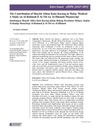 162 citations,
July 2011 in “Biomacromolecules”
162 citations,
July 2011 in “Biomacromolecules” Chitosan nanofiber scaffolds improve skin healing and are promising for wound treatment.
 September 2022 in “Research Square (Research Square)”
September 2022 in “Research Square (Research Square)” Caffeic acid helps protect rats from the harmful effects of acrylamide.
 August 2023 in “Medicina-lithuania”
August 2023 in “Medicina-lithuania” Abusing steroids can damage your heart, muscles, reproductive system, liver, skin, and brain, and may increase the risk of Alzheimer's disease.

Plant-based compounds can improve wound dressings and skin medication delivery.
 4 citations,
January 2020 in “Cells”
4 citations,
January 2020 in “Cells” The research found that the gene activity in mouse skin stem cells changes significantly as they age.
 1 citations,
July 2023 in “Foods”
1 citations,
July 2023 in “Foods” Mushrooms offer benefits for food, energy, and water security, and have potential uses in health and environmental applications.

Off-label drug use can be risky but sometimes beneficial when standard treatments fail.
 July 2012 in “Springer eBooks”
July 2012 in “Springer eBooks” The document concludes that proper diagnosis and treatment of nonscarring alopecias can improve quality of life and hair regrowth is possible as the hair follicle remains intact.
January 2023 in “Dermatologic Therapy” Intralesional corticosteroids and 5-alpha-reductase inhibitors are the best treatments for frontal fibrosing alopecia.
 September 2023 in “Frontiers in cell and developmental biology”
September 2023 in “Frontiers in cell and developmental biology” Vav2 changes how hair follicle stem cells' genes work as they age, which might improve regeneration but also raise cancer risk.
 December 2023 in “Biointerface Research in Applied Chemistry”
December 2023 in “Biointerface Research in Applied Chemistry” Stiripentol shows promise as a potential treatment for androgen-related diseases but needs more testing.
 52 citations,
January 2022 in “Current Research in Pharmacology and Drug Discovery”
52 citations,
January 2022 in “Current Research in Pharmacology and Drug Discovery” New treatments for COVID-19 show promise, but more effective antiviral drugs are needed.
 14 citations,
November 2020 in “International Journal of Molecular Sciences”
14 citations,
November 2020 in “International Journal of Molecular Sciences” Advanced therapies like gene, cell, and tissue engineering show promise for hair regrowth in alopecia, but their safety and effectiveness need more verification.
 33 citations,
January 2021 in “Aesthetic Surgery Journal”
33 citations,
January 2021 in “Aesthetic Surgery Journal” Low-Level Light Therapy (LLLT) is a safe and effective method for skin rejuvenation, acne treatment, wound healing, body contouring, and hair growth, but more well-designed trials are needed for confirmation.
 49 citations,
April 2016 in “International journal of molecular sciences”
49 citations,
April 2016 in “International journal of molecular sciences” Shift nurses show altered body temperature and stress hormone levels, suggesting their body clocks adjust to irregular schedules.
 1 citations,
July 2020 in “Dermatology”
1 citations,
July 2020 in “Dermatology” Photobiomodulation helps reduce pain, lessen inflammation, heal wounds, and can be used in skin treatments. It also boosts hair growth in women with hair loss and may help fight microbes and prevent respiratory issues in COVID-19.
 May 2023 in “Jurnal Sains Insani”
May 2023 in “Jurnal Sains Insani” Shaykh Abbas Kuta Karang significantly advanced Malay medical knowledge with his detailed manuscript.
 2 citations,
March 2023 in “Biomedicine & pharmacotherapy”
2 citations,
March 2023 in “Biomedicine & pharmacotherapy” Platelet lysate effectively promotes hair growth and improves hair thickness in people with androgenetic alopecia.
 November 1999 in “Journal of Cutaneous Medicine and Surgery”
November 1999 in “Journal of Cutaneous Medicine and Surgery” Treatments for hair loss include hormone modifiers, minoxidil, and hair transplant surgery.
 1 citations,
January 2023 in “Brazilian Journals Editora eBooks”
1 citations,
January 2023 in “Brazilian Journals Editora eBooks” Children's screen time increased during the pandemic, causing various health issues.
 July 2024 in “Gene & Protein in Disease”
July 2024 in “Gene & Protein in Disease” Exosome therapy shows promise for treating skin conditions and improving wound healing.
 21 citations,
January 2020 in “General and Comparative Endocrinology”
21 citations,
January 2020 in “General and Comparative Endocrinology” Lack or blocking of SRD5a, a key component in hormone creation, can lead to conditions like pseudohermaphrodism and affect hair growth, bone mass, muscle strength, and reproductive health. More research is needed on its regulation from fertilization to adulthood.
 37 citations,
January 2013 in “Postepy Dermatologii I Alergologii”
37 citations,
January 2013 in “Postepy Dermatologii I Alergologii” Isotretinoin effectively reduces acne but causes dry skin, higher skin pH, more redness, and hair loss.
Different genes and pathways are active in yak skin and hair cells, affecting hair growth and immune responses.
 12 citations,
August 2022 in “Biochemical Journal”
12 citations,
August 2022 in “Biochemical Journal” Different types of cell death affect skin health and inflammation, and understanding them could improve treatments for skin diseases.

Optical Coherence Tomography has potential in diagnosing hair loss and monitoring blood clotting, and could be improved for deeper tissue observation and better hair loss understanding.
 15 citations,
November 2019 in “Cutaneous and Ocular Toxicology”
15 citations,
November 2019 in “Cutaneous and Ocular Toxicology” Minoxidil tretinoin liposomal based hydrogel shows promise for effective treatment of hair loss by delivering both drugs at the same time.
 October 1971 in “The BMJ”
October 1971 in “The BMJ” Hair loss can be linked to hormonal changes, and physical conditions like heart defects can cause depression.
69 citations,
April 2010 in “Clinical ophthalmology” Bimatoprost is effective for growing longer, thicker, and darker eyelashes.
 March 2024 in “GSC Advanced Research and Reviews”
March 2024 in “GSC Advanced Research and Reviews” Different light affects cell functions and can help treat skin conditions.



























